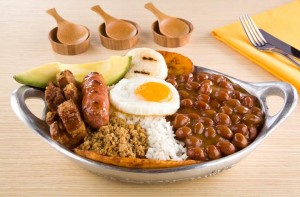The informant, S, is 18 years old and from Miami, Florida, but he grew up in Cartagena, Colombia (Northern, Columbia). His mom is from Barranquilla, Columbia (Northern Columbia), while his dad is from Cartagena, Columbia. He considers himself a Latino Columbian and is majoring in Civil Engineering Building Science.
S- “Ok so my Colombian culture has a lot of folklore, um primarily food. One of the main dishes is called Bandeja Paisa. It’s uh in my opinion a very good dish.”
What does it consist of?
S-“It consists of usually white rice and egg on top the rice. You have your steak and then you have an arepa, which is like a flour and corn thing. And usually we have chicharron (pork rinds) on the side and the dish usually also has patacones, which are also known as tostones (fried plantain slices)”
When do usually eat it?
S-“Anytime usually when you go out to a Columbian restaurant this is your go to dish”
Does your family make it?
S-“Yea my mom makes it all the time, but we go out to eat it from like the different Columbian restaurants from Miami, where I’m from”
Would you say each family has its own different recipe or it’s the same everywhere you go?
S-“Just like any recipe it can be tweaked here and there. Like for example the steak can be either carne asada (steak) or carne molida (ground beef), so it’s two different kinds of steak. And some people don’t like having the arepa on the side. It depends on the time when you have it. For example if you’re having it for brunch then you’d have the arepa and if you’re eating it more towards dinner then you wouldn’t have the arepa present on the dish”
Are there any other sides that go with it?
S-“Um yea I actually forgot to mention they usually have frijoles (beans) or lentejas (lentil) on the side so you can put it with your rice”
Analysis- The dish consists of many of the local and plentiful types of food that are present in the area and in the country. It is also evidence of the impact different cultures have left there over time, mainly from the conquistadors from Spain, France, and Britain. The name also is part of the country as it consists of the area it originated from (Paisa) and its appearance of a bandeja (large pot or bowl). While there may not be one official authentic bandeja paisa, due to the fact that it can be tweaked and no one can for sure know which is the original recipe, the people don’t seem to mind this, for they even go out their ways to try it at different places.

